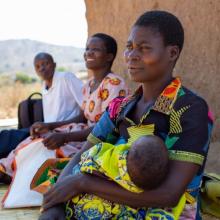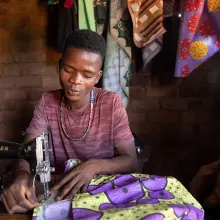Thérèse,* a resident of Haiti’s Artibonite region, is living with a renewed sense of hope and strength due to her involvement in a program called the “Mothers Club,” dedicated to women living with HIV and their children.
The group, supported by Zanmi Lasante (ZL), as Partners In Health is known in Haiti, offers a lifeline to those facing challenges of the disease, providing long-term medical care, social support, and other essential resources.
Reflecting on the moment she first learned of her HIV diagnosis, Thérèse vividly recalls the shock and confusion she felt. “I didn’t know how I caught the virus,” she said.
It was a difficult time, but with ZL’s unwavering support, Thérèse was able to regain control of her life. “I feel good,” she shared, expressing deep gratitude for the ongoing care she receives.
As the largest provider of HIV care in Haiti’s Central Plateau and lower Artibonite regions, ZL’s approach follows the patient-centred accompaniment model, focusing on prevention, screening, treatment, and support through solidarity. The organization offers free HIV and tuberculosis (TB) screening tests, distributes vital medications, and provides support that goes beyond medical care. ZL’s efforts have led to a reduction in mother-to-child transmission of HIV and improved survival rates for those living with HIV and TB in Haiti.
Thérèse’s daughter, Tatiana,* who was born with HIV, also benefits from the program. Under ZL’s care, Tatiana is living a normal life, growing up without the limitations often imposed by the disease, including stigma and discrimination that can lead to social isolation.
Thérèse is especially grateful for the community health workers and social workers whose support is also a source of motivation for her. “When I’m discouraged, they come to my house. They help me continue my treatment, “she said.
For Thérèse and Tatiana, support from ZL is key to building their future. With the organization’s help, they look ahead with hope, living each day with dignity.
*Names were changed to preserve patients’ identities.
Originally published on pih.org


